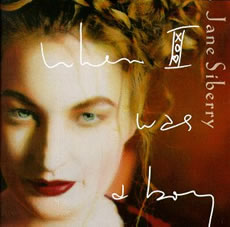
Image © Reprise Records 1992
|
|
(25 November 2004) Between her self-titled debut released in 1981 and this year's Shushan the Palace: Hymns of Earth, Jane Siberry has released, at a rough count, eighteen albums of varying styles and quality, each different from the last, each unexpected and ambitious. In her native Canada, she's achieved almost iconic status both within the music industry and among the music-loving public. In 1992 she released the CD that many consider, not just her finest album, but one of THE finest albums. Period. When I Was Boy (Reprise Records (USA) 7599-26824-2, 1992) explores love in all its wondrous manifestations, with the joy and sensuality as well the hurt and loneliness of its painful twists and turns. It is light years distant from the way the subject is dealt with in the music world generally. The emotional intensity of this album is extraordinary. People have been known to break down in tears when hearing it for the first time and it clearly has the ability to touch something deep inside in a way very, very few other albums can. There are numerous stories of the affect this music can have. For example, on its release, a DJ at a community radio station in Canada played the first track 'Temple" and decided it was so incredible, he let it roll over to track 2 ... 70 minutes later, he'd played the whole album uninterrupted by a even a single word from himself. And Tom G. Anderson, Ph.D. uses it in his University classes. "In the teaching of existential-ontological perspectives for therapeutic helping. Siberry's treatment of human authenticity and the givens of being/nonbeing are supurb." So now we know. He adds, "Most importantly, When I Was A Boy is simply beautiful." And it's true, it is a very beautiful album, but it is also very difficult music to get into. It's a complex tapestry of sounds and vocals, and whilst the lyrics are imaginative, quirky and poetic, they are also at times obscure, and will lead you to places you don't always want to visit (or revisit), but ultimately it will reward many-fold those who make the crossing. "Sail Across The Water" is the most accessible track with a chorus that will lodge in your brain for hours afterwards. Follow this with "Temple" which at least has something that vaguely resembles a verse, chorus and middle 8 structure. On "The Gospel According To Darkness" Jane gets some vocal assistance from, among others, fellow Canadian, Holly Cole, and she duets with another fellow citizen, k.d. lang on 'Calling All Angels" which has a countryish feel. Well, country, but not as we know it. The musicians on the album are people she's worked with for a number of years and who are clearly in tune with what she's attempting to pull off here - and the production and sound quality of the CD is stupendous. It's largely self-produced, though Brian Eno's name is appended to a couple of the tracks and one senses Jane learnt a lot from the experience of working with him. It's best to build up slowly to tracks like "All The Candles In The World"--though you could certainly dance to some of it from play one--and "Sweet Incarnadine" which was edited down from a 20 minute improvisation. Parts of an "An Angel Steps Down" remind one a little of a high church service with it call and response and spoken sections--but it also has some of the catchiest rhythms and lyrics on the album--and it's as varied a track asyou'll find anywhere. The nine minutes of "The Vigil" is like a film. Ultimately, this CD is best listened to from start to finish, through headphones, and in a darkened room. But for those new to Jane Siberry or who've just experienced turmoil in their love life, it's perhaps best used sparingly. It's undoubtedly a five-star album, but you really do have to earn them.--Jamie Field in Kington, England their love life, it's perhaps best used sparingly. It's undoubtedly a five-star album, but you really do have to earn them.--Jamie Field in Kington, England 
|






